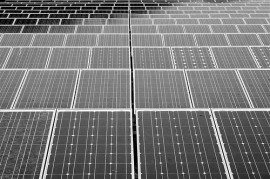There are any number of conspiracy theories and news stories looking at the oversupply of solar panels currently flooding the market, and a general negative view of the solar industry has followed.
However, Director of the Resnick Sustainability Institute and Howard Hughes Professor and Professor of Applied Physics and Materials Science at Caltech Dr. Harry A. Atwater believes the current glut of solar panels is a good thing for the industry.
“There has never been a better time to go ‘long’ on innovative solar technology,” said Atwater.
“If we invest now, by the time the industry recovers from today’s oversupply crisis, very advanced innovations will have emerged that can fuel the next wave of solar technology. These will build on the momentum created by the current phase of the market and dramatically expand the usefulness and adoption of solar.”
Atwater shared his opinions at the VX 2013 Conference in Los Angeles, explaining how the market arrived where it is now and how it could be viewed as a good thing, in the long term.
The problem stems from the fact that the solar industry grew so fast and efficiently that it reached a worldwide module production capacity of 60 GW peak.
Sounds good, right?
Problem is, during 2012, there was only demand for 35 GW of modules, and 2013 is predicted to only require demand in the 40 GW range.
The industry is, therefore, “under water.” Some companies have gone bankrupt, while consumers are living the dream, encountering lower-than-ever prices.
“This period in the history of the solar market is like the ‘dotcom bubble’,” said Atwater. “During that era, there was a lot of financial and entrepreneurial pain, but vast amounts of infrastructure, market exposure and adoption occurred which catalyzed today’s dramatic growth in worldwide use of the Web. We believe the same is true of solar.”
Atwater believes that those companies who go long on solar now — by supporting the innovations currently underway — are going to benefit in the long run, even if they might sacrifice some short term success.










